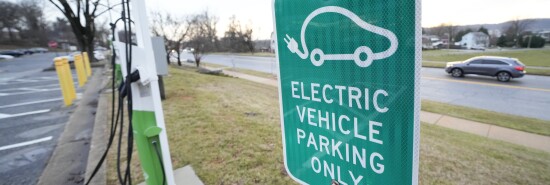
Bidenomics short-circuits electric car hopes
Timothy P. Carney
Video Embed
Building a nationwide network of chargers for plug-in cars is not easy because there are challenges involving electrical engineering, civil engineering, and financing. President Joe Biden‘s current effort to electrify America’s highways has another enemy: politics.
If “Bidenomics” has a clear meaning, it’s that the U.S. government should give orders to the private sector. Other names for this idea include “industrial policy” or “corporatism.”
HUNTER BIDEN WILLING TO TESTIFY BEFORE OVERSIGHT COMMITTEE IN PUBLIC HEARING, HIS ATTORNEY SAYS
Biden and his economic team understand that the private sector is needed for innovation, efficiency, and growth. That’s why Biden is not a socialist, as the most energetic part of his party is.
Bidenomics is based on the dream of steering the vitality of free enterprise with the tools of subsidies, regulations, and mandates. The unhappy result, in most cases, is that good ideas get killed by politics. This is the fate of Biden’s planned network of car chargers.
The story begins in spring 2020, as candidate Biden was shifting from the Democratic primary to the general election. Biden, as part of his massive stimulus plans (which gave us sky-high inflation), pledged to install half a million chargers for plug-in electric cars.
Then Biden took office and promptly passed a massive infrastructure bill, which included $7.5 billion for chargers. It is now late 2023, and not a single new charger has been installed with this money. The reason is politics.
While $7.5 billion is a lot of money, it’s only about half of what’s needed to install 500,000 rapid chargers. But Biden had pledged 500,000, and so he modified his plans: Many of the chargers would not be rapid chargers but instead be slower Level 2 chargers, which take about an hour of charging for every hour of driving.
These chargers are fine for topping off your battery as you do grocery shopping, but no number of these chargers could make possible a road trip in a plug-in car. Biden’s insistence on quantity over quality undermines the purported aims of the program, but it keeps alive a specific political promise Biden made.
Then there’s Biden’s Buy America problem. The infrastructure bill had union support because it was a jobs bill, and it had industry support because it was a corporate welfare bill. To please these constituencies, though, Congress included a Buy American provision in the bill, requiring that 55% of materials in any project funded by the bill be made in America.
The Biden administration knew that any nationwide charger network would require more foreign parts than that allowed, and so Biden sought a waiver to the Buy American provision. The U.S. Senate blocked Biden, which will result in a massive slowdown in the construction and installation of these charging stations. Again, politics over practicality.
It was Biden’s Transportation Department that rejected a different plea for flexibility. Wyoming, which is very sparsely populated, asked if it could concentrate its federally funded charging stations around tourist areas such as Yellowstone National Park. The Federal Highway Administration has largely rejected Wyoming’s requests.
The pattern is an obvious one: The ambitious goals of the politicians get derailed by politics. This is always the story of industrial policy because industrial policy is explicitly about blending politics and industry.
Democrats, despite their anti-corporate rhetoric, have long supported corporatist industrial policy. Corporate welfare was the centerpiece of Obamanomics. At times, Obama called it New Economic Patriotism.
Republicans have become more interested in this corporatist game during the Trump Era. Former President Donald Trump and some of his advisers, such as then-Commerce Secretary Wilbur Ross, explicitly said that the U.S. should emulate China’s model of state-backed capitalism.
CLICK HERE TO READ MORE FROM THE WASHINGTON EXAMINER
But today’s pro-corporatism conservatives find themselves continually frustrated that politics is creeping into their industrial policy. Biden’s effort to build out a semiconductor industry, politics has kept him from hiring foreign workers. Because the federal government is subsidizing this industry, Biden is placing all sorts of irrelevant culture war mandates on them (such as in-house daycare for workers).
It seems that when the government steers the ship of the economy, it has trouble steering straight.
